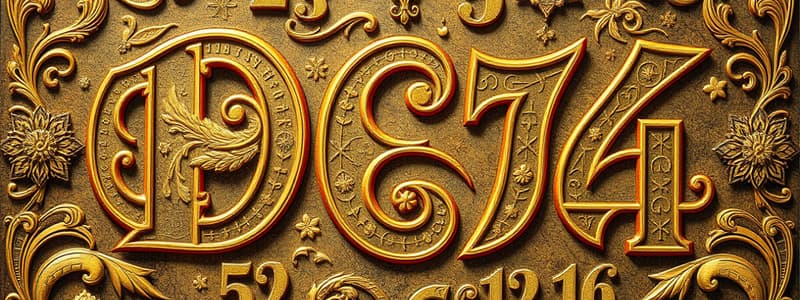Podcast
Questions and Answers
Which of the following statements is true regarding types of numbers?
Which of the following statements is true regarding types of numbers?
- All complex numbers are also real numbers.
- Every prime number is also a composite number.
- All irrational numbers are also rational numbers.
- All whole numbers are also integers. (correct)
What is the least common multiple (LCM) of 6 and 8?
What is the least common multiple (LCM) of 6 and 8?
- 12
- 24 (correct)
- 36
- 18
In a decimal number system, which of the following numbers is represented by the binary number 1011?
In a decimal number system, which of the following numbers is represented by the binary number 1011?
- 11 (correct)
- 8
- 9
- 10
Which of the following is not a property of prime numbers?
Which of the following is not a property of prime numbers?
Which operation should be performed first according to the order of operations in the expression 3 + 5 × (2 - 1)?
Which operation should be performed first according to the order of operations in the expression 3 + 5 × (2 - 1)?
Flashcards are hidden until you start studying
Study Notes
Types of Numbers
- Natural Numbers: Positive integers (1, 2, 3, …).
- Whole Numbers: Natural numbers including zero (0, 1, 2, 3, …).
- Integers: Whole numbers and their negatives (…, -3, -2, -1, 0, 1, 2, 3, …).
- Rational Numbers: Numbers that can be expressed as a fraction of two integers (e.g., 1/2, 3/4).
- Irrational Numbers: Numbers that cannot be expressed as a simple fraction (e.g., √2, π).
- Real Numbers: All rational and irrational numbers.
- Complex Numbers: Numbers in the form a + bi, where a and b are real numbers, and i is the imaginary unit.
Properties of Numbers
- Even Numbers: Divisible by 2 (e.g., -4, 0, 2, 4).
- Odd Numbers: Not divisible by 2 (e.g., -3, 1, 3, 5).
- Prime Numbers: Greater than 1, only divisible by 1 and itself (e.g., 2, 3, 5, 7).
- Composite Numbers: Greater than 1, divisible by numbers other than 1 and itself (e.g., 4, 6, 8).
Number Systems
- Decimal System: Base-10, uses digits 0-9.
- Binary System: Base-2, uses digits 0 and 1.
- Octal System: Base-8, uses digits 0-7.
- Hexadecimal System: Base-16, uses digits 0-9 and letters A-F.
Basic Operations
- Addition: Combining numbers to get a sum.
- Subtraction: Finding the difference between numbers.
- Multiplication: Repeated addition of a number.
- Division: Splitting a number into equal parts.
Order of Operations
- Parentheses
- Exponents
- Multiplication and Division (from left to right)
- Addition and Subtraction (from left to right)
Number Theory Concepts
- Divisibility: A number is divisible by another if there is no remainder.
- Factors: Numbers that divide another number evenly.
- Multiples: The result of multiplying a number by an integer.
- Greatest Common Divisor (GCD): Largest number that divides two or more numbers.
- Least Common Multiple (LCM): Smallest multiple that is exactly divisible by two or more numbers.
Applications of Numbers
- Mathematics: Fundamental to all areas of math.
- Science: Used in measurements, calculations, data analysis.
- Finance: Essential for budgeting, accounting, and economic analysis.
- Technology: Core component of computer programming and data processing.
Types of Numbers
- Natural Numbers: Sequence of positive integers starting from 1 (1, 2, 3, …).
- Whole Numbers: Natural numbers including zero (0, 1, 2, 3, …).
- Integers: Includes all whole numbers and their negative counterparts (…, -3, -2, -1, 0, 1, 2, 3, …).
- Rational Numbers: Can be expressed as a fraction where both the numerator and denominator are integers (e.g., 1/2, 3/4).
- Irrational Numbers: Cannot be expressed as fractions; their decimal representations are non-repeating and non-terminating (e.g., √2, π).
- Real Numbers: Encompasses all rational and irrational numbers, forming the complete number line.
- Complex Numbers: Formed of a real part (a) and an imaginary part (b) combined as a + bi, where i represents the imaginary unit.
Properties of Numbers
- Even Numbers: Integers divisible by 2, including negatives and zero (e.g., -4, 0, 2, 4).
- Odd Numbers: Integers not divisible by 2, both positive and negative (e.g., -3, 1, 3, 5).
- Prime Numbers: Natural numbers greater than 1 that have no divisors other than 1 and themselves (e.g., 2, 3, 5, 7).
- Composite Numbers: Natural numbers greater than 1 that have divisors other than just 1 and themselves (e.g., 4, 6, 8).
Number Systems
- Decimal System: Base-10 numeral system that uses digits 0-9 for representation.
- Binary System: Base-2 system using only two digits, 0 and 1, commonly used in computing.
- Octal System: Base-8 numeral system employing digits 0-7.
- Hexadecimal System: Base-16 system that includes digits 0-9 and letters A-F to represent values.
Basic Operations
- Addition: Process of finding the total or sum by combining numbers.
- Subtraction: Determining the difference between two numbers.
- Multiplication: Involves repeated addition of a number for a specified number of times.
- Division: Operation that splits a number into a specified number of equal parts.
Order of Operations
- Follow the sequence: Parentheses, Exponents, Multiplication and Division (left to right), Addition and Subtraction (left to right).
Number Theory Concepts
- Divisibility: A condition where one number can be divided by another without leaving a remainder.
- Factors: Whole numbers that divide another number exactly without leaving a remainder.
- Multiples: Results obtained by multiplying a given number by any integer.
- Greatest Common Divisor (GCD): The largest integer that can divide two or more numbers without a remainder.
- Least Common Multiple (LCM): The smallest integer that is a multiple of two or more numbers.
Applications of Numbers
- Mathematics: Foundation for various branches of math, including algebra, geometry, and statistics.
- Science: Involves numerical measurements for calculations, experiments, and data analysis.
- Finance: Critical in managing budgets, conducting accounting, and performing economic assessments.
- Technology: Integral to programming languages, algorithms, and data manipulation in computing.
Studying That Suits You
Use AI to generate personalized quizzes and flashcards to suit your learning preferences.




